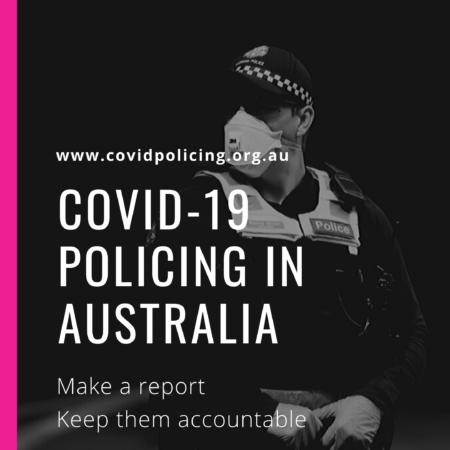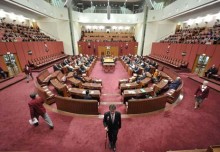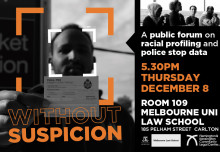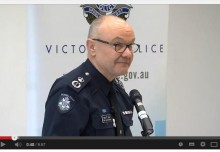
10 reasons we are concerned about the policing of Stage 4 restrictions in Victoria
These new Stage 4 restrictions in Victoria are important to slow the spread of COVID 19. Yes, you should wear a mask. Yes you stay home if you are able. Yes you should follow the public health directions. They are in place for a legitimate public health reason.
How these restrictions are policed however, is a huge area of concern and warrants scrutiny and debate.
Here are our ten main concerns. All of these are based upon actual cases and accounts or lessons from the policing of previous health crisis.
1: Police aren’t good at interpreting exemptions.
The new Stage 4 directives have important exemptions for important reasons. If you or someone needs care you are permitted to be out, even after curfew, but police are not trained or equipped to make these often complex assessments. How will a police member react to person going to visit a suicidal friend they are worried about? Or a young teenager out riding his bike at night because his dad hits him? It depends entirely on the police officer that they happen to encounter.
Police inability to assess health needs is dangerous. Police are trained to see risk and threat. Many people get nervous around police even if they have done nothing wrong yet police interpret any signs of nervousness as elusiveness. Police will often interpret a person’s cry for help as a threat. Even simple questions can be interpreted as aggression. We saw this during the Flemington & Nth Melbourne public housing towers lockdown. Police ignored genuine health based exemptions and continually resorted to lock-down responses because it more closely aligned with their training. We have reports of carers who were out walking with people with chronic illness. In late July a woman was fined when walking with a cancer patient recently released from hospital. In some cases, this inability to assess health needs put lives in danger. Under Stage 4 health workers no longer ‘need’ to accompany police on door knock compliance checks and the risk of misinterpretation will increase.
As Elena Campbell, associate director of the Centre for Innovative Justice, has said (The Age 4/8/2020) young people out after 8pm must be offered assistance and risk assessment, rather than punishment. “Victoria Police and other authorised officers under the Emergency Management Act need to recognise that not everyone out after 8pm will be flagrantly flouting the law but may be managing risk to their own or others’ safety – and plan accordingly. A response informed by evidence and an awareness of the risks that many young people face, rather than a punitive one, will avoid more and more children from being propelled into contact with the criminal justice system.”
2. Policing itself can have public health impacts.
For communities who experience intense levels of discriminatory policing already, policing causes a great deal of stress, anxiety and feelings of exclusion. This stress and exclusion runs opposite to what public health measures are needing to achieve. The CovidPolicing website – which collects reports of people’s encounters with police found that people “were left feeling singled out, treated unfairly, targeted, discriminated against, sad and hurt, angry, in disbelief, shocked, very traumatised, quite upset, scared,” after their encounters with police. Police encounters can have significant mental health impacts and those groups who experience repeated police contact report more trauma and anxiety symptoms, associations tied to how many stops they reported, the intrusiveness of the encounters, and their perceptions of police fairness. Recent Melbourne studies from Monash University have highlighted the exclusionary impacts of unexplained stops, racial vilification, and other hostile, discriminatory or violent encounters. These dynamics continue in the policing of these new Stage 4 restrictions.
3. Curfews are dangerous.
Whilst the policing of curfews and restrictions may seem justified, they can still be applied in a discriminatory, abusive and harmful manner. Curfews designed almost purely to make policing a population easier. But for those who have to be out during a curfew, for work, for care and compassionate grounds or for their own safety, are at the whim of police discretion and therefore far more likely to receive fines or worse, even if they are doing the right thing. Contact with police becomes more likely and there are far fewer accountability measures in place during a curfew such as bystanders, media and observers. The risk is therefore higher for a smaller group of people simply because they are out after curfew.
4. Police discretion is exercised differently for different people.
For some, explaining why you are out will be believed. For others, police may not believe you. What color you are, how ‘well’ you can explain yourself and how you are perceived by the police you happen to encounter will determine if you are believed or fined. This is the nature of discriminatory policing. It is well documented and seemingly endemic to police everywhere. The Victorian Government is still in denial about it.
5. Every police encounter can be dangerous.
If you try and explain why you are out, if you ask police too many questions or if either of you get frustrated, there is a risk that the encounter could end with physical force, arrest and charges. This risk is there for everyone who encounters a police officer – not just for those who are ‘doing the wrong thing’.
6. Every police encounter can be a point of transmission.
Any use of force, arrests, transport or custody is particularly dangerous. We need to minimize these transmission risks not increase them.
7. Policing undermines public health responses.
8. There is no evidence that policing is helping.
9. It undermines other options.
Using huge numbers of police and military personnel undermines the capacity of civil society to respond to this and future disasters. The millions we are spending on police & ADF members to be out all night in our communities could have gone to local community services and organisations to build local response & resilience networks with support, education and compliance functions. We desperately need 24 hour youth work and mental health responses in Victoria. We are squandering the opportunity to do this. Armed with local knowledge, tailored and responsive for particular communities these responses could have been arguably far more effective than police.
10. Finally, we are increasing the risk of this sort of policing being normalised.
If this goes on for much longer it could shape our lives and society in ways we don’t want. Lets not get used to police and military controlling our lives and movements. Instead lets develop and emphasize health-led, civil society responses which centre care and compassion and build capacity, resilience and strength.
Maybe that will help us come out of this awful pandemic a stronger society.
All of the above is based upon actual cases we have and accounts we have received over the pandemic so far or based upon research from previous public health crisis.
Just in case you may be thinking this is all about “finding loopholes” or for those who believe the public health restrictions are not necessary – NO – the restrictive measures put in place to prevent the spread of COVID-19 ARE vital and they can save lives! You should wear a mask, stay home if you are able and everyone should follow the public health directions. The ten concerns above are about the very real harms of policing and based upon the lessons of previous health crisis, our experience, and those of the individuals and communities we have worked with for decades now. Our concern is how this policing will impact upon individuals and communities trying to do the right thing amidst this crisis.
The Police Accountability Project is part of a national collaborative project which is tracking the use of emergency powers and policing during this public health emergency. You can report an issue or incident at covidpolicing.org.au.
If you have a complaint please refer to our Police Complaint Links and Resources page. You can also use the Police Complaints Chatbot to assist you in drafting a letter of complaint directly to Victoria Police or IBAC.
Read our original statement Policing the Pandemic (March 2020) here.
Reporting incidents
Have you been stopped by police or had any interaction with police since the new public health rules were introduced in your area? Do you feel you have been treated unfairly? Do you know of an incident that concerns you?
You can report it here

Complaints about police misconduct
The Police Complaints Chatbot can assist you in drafting a letter of complaint directly to Victoria Police or IBAC.
Anyone who has experienced police misconduct can have a conversation with the Police Complaints Chatbot, which then drafts a letter of complaint and instructs you how to lodge the complaint. You will have a choice when and where to lodge your complaint. Please note that if you have been charged or believe that you may be charged, you should seek legal advice from a criminal lawyer before lodging a complaint.
Related media:
Curfew must involve a plan for those who have no choice but to be out, Elena Campbell, The Age Opinion, 4 August 2020
“As with most other measures adopted to slow the spread of the virus, however, the imposition of a curfew and increased enforcement powers associated with the declaration of a state of disaster will have the greatest impacts on the most vulnerable Victorians.”
More COVID-19 fines for Victoria’s most disadvantaged areas, Adam Cooper, The Age, 4 August 2020
“Victoria’s three poorest communities have copped 10 per cent of its COVID-19 fines, while its three most advantaged local government areas were dealt less than two per cent of infringements in the same period.
Victoria coronavirus fines: City of Melbourne and Frankston have the most fines, Lucy Mae Beers, 7 News, 5 June 2020
“Victorians have been issued 5957 fines since officers were granted the power to give $1652 fines to individuals and up to $9913 for businesses. This is more than double the fines issued in Queensland, which is 2069 and three times those in NSW at 1290.
Victoria has issued the most fines for lockdown breaches, while the ACT hasn’t fined anyone, Claudia Farhart, SBS News, 24 April 2020.
” New police data suggests there are substantial differences in how each Australian state and territory is enforcing coronavirus restrictions. While each state and territory has implemented similar social distancing rules agreed by the national cabinet on the basis of medical advice, the number of fines issued in each jurisdiction ranges from almost 2,000 to zero.”
Compliance fines under the microscope, Osman Faruqi, The Saturday Paper, 18 April, 2020
“A coalition of legal services, co-ordinated by the Flemington and Kensington Community Legal Centre, has written to police commissioners around the country, calling on a uniform approach to data collection and oversight…
Concerns police using coronavirus powers to target marginalised communities in Australia, Jarni Blakkarly, SBS News, 12 April 2020
“Legal advocates and researchers have urged police to issue more police data and provide clearer guidelines on how fines are being issued for the breach of coronavirus-related public health regulations in each state and territory. The call comes amid concerns that culturally diverse and low socio-economic groups are bearing the brunt of the police actions…




